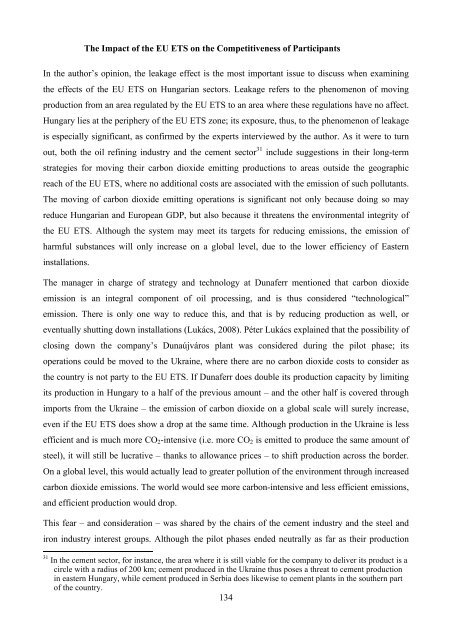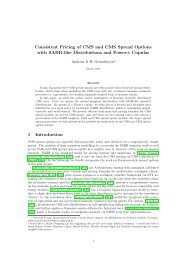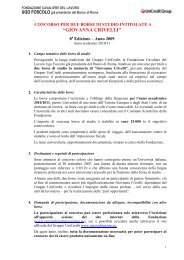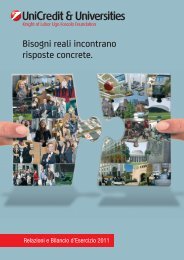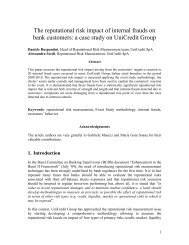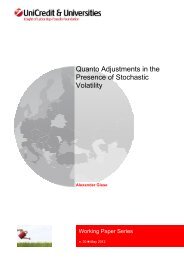Dóra Fazekas Carbon Market Implications for new EU - UniCredit ...
Dóra Fazekas Carbon Market Implications for new EU - UniCredit ...
Dóra Fazekas Carbon Market Implications for new EU - UniCredit ...
Create successful ePaper yourself
Turn your PDF publications into a flip-book with our unique Google optimized e-Paper software.
The Impact of the <strong>EU</strong> ETS on the Competitiveness of Participants<br />
In the author’s opinion, the leakage effect is the most important issue to discuss when examining<br />
the effects of the <strong>EU</strong> ETS on Hungarian sectors. Leakage refers to the phenomenon of moving<br />
production from an area regulated by the <strong>EU</strong> ETS to an area where these regulations have no affect.<br />
Hungary lies at the periphery of the <strong>EU</strong> ETS zone; its exposure, thus, to the phenomenon of leakage<br />
is especially significant, as confirmed by the experts interviewed by the author. As it were to turn<br />
out, both the oil refining industry and the cement sector 31 include suggestions in their long-term<br />
strategies <strong>for</strong> moving their carbon dioxide emitting productions to areas outside the geographic<br />
reach of the <strong>EU</strong> ETS, where no additional costs are associated with the emission of such pollutants.<br />
The moving of carbon dioxide emitting operations is significant not only because doing so may<br />
reduce Hungarian and European GDP, but also because it threatens the environmental integrity of<br />
the <strong>EU</strong> ETS. Although the system may meet its targets <strong>for</strong> reducing emissions, the emission of<br />
harmful substances will only increase on a global level, due to the lower efficiency of Eastern<br />
installations.<br />
The manager in charge of strategy and technology at Dunaferr mentioned that carbon dioxide<br />
emission is an integral component of oil processing, and is thus considered “technological”<br />
emission. There is only one way to reduce this, and that is by reducing production as well, or<br />
eventually shutting down installations (Lukács, 2008). Péter Lukács explained that the possibility of<br />
closing down the company’s Dunaújváros plant was considered during the pilot phase; its<br />
operations could be moved to the Ukraine, where there are no carbon dioxide costs to consider as<br />
the country is not party to the <strong>EU</strong> ETS. If Dunaferr does double its production capacity by limiting<br />
its production in Hungary to a half of the previous amount – and the other half is covered through<br />
imports from the Ukraine – the emission of carbon dioxide on a global scale will surely increase,<br />
even if the <strong>EU</strong> ETS does show a drop at the same time. Although production in the Ukraine is less<br />
efficient and is much more CO2-intensive (i.e. more CO2 is emitted to produce the same amount of<br />
steel), it will still be lucrative – thanks to allowance prices – to shift production across the border.<br />
On a global level, this would actually lead to greater pollution of the environment through increased<br />
carbon dioxide emissions. The world would see more carbon-intensive and less efficient emissions,<br />
and efficient production would drop.<br />
This fear – and consideration – was shared by the chairs of the cement industry and the steel and<br />
iron industry interest groups. Although the pilot phases ended neutrally as far as their production<br />
31<br />
In the cement sector, <strong>for</strong> instance, the area where it is still viable <strong>for</strong> the company to deliver its product is a<br />
circle with a radius of 200 km; cement produced in the Ukraine thus poses a threat to cement production<br />
in eastern Hungary, while cement produced in Serbia does likewise to cement plants in the southern part<br />
of the country.<br />
134


